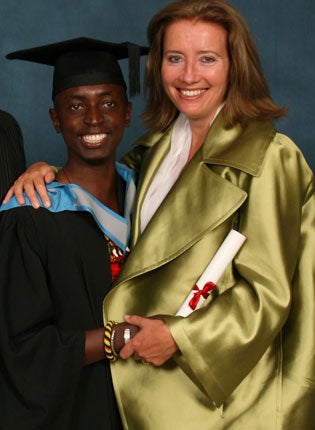Your support helps us to tell the story
From reproductive rights to climate change to Big Tech, The Independent is on the ground when the story is developing. Whether it's investigating the financials of Elon Musk's pro-Trump PAC or producing our latest documentary, 'The A Word', which shines a light on the American women fighting for reproductive rights, we know how important it is to parse out the facts from the messaging.
At such a critical moment in US history, we need reporters on the ground. Your donation allows us to keep sending journalists to speak to both sides of the story.
The Independent is trusted by Americans across the entire political spectrum. And unlike many other quality news outlets, we choose not to lock Americans out of our reporting and analysis with paywalls. We believe quality journalism should be available to everyone, paid for by those who can afford it.
Your support makes all the difference.Emma Thompson has criticised Government policy towards child asylum seekers, many of whom are offered years of protection before being deported as soon as they turn 18.
The actress, who "informally adopted" 24-year-old Rwandan refugee Tindyebwa Agaba in 2003 and legally sponsored his successful battle to stay in Britain, has spoken out against officials' treatment of unaccompanied asylum-seeking children, who become easier to deport as soon as they become adults.
"It is current British policy to send back lone child refugees as soon as they turn 18 to the war zones from which they fled," Thompson said. "But no one has any idea what then happens to these kids, who've adapted to British life."
Referring to Mr Agaba, who graduated from Exeter University last year, she said she was happy to have seen him "flourish and achieve his potential". She added: "I wish others could be given the same chances as him, and not thrown out of their lives here, at the very point when they start to become useful and effective adults."
Thompson is supporting Hamedullah: The Road Home, a film by children's rights campaigner and director Sue Clayton, which will be screened by Amnesty International at London's Tricycle Cinema on Thursday.
The film follows the story of former child asylum seeker Hamedullah Hassany, 21, who was seized and deported after a dawn raid in Canterbury in November 2008. He is currently unemployed and living in Northern Afghanistan.
"The reason I made this, really, is that he is a human being and I am tired of asylum seekers being referred to just in headlines," said Ms Clayton. "I knew him as a person. Just imagine if it was one of our own kids. You want to understand how they might survive."
There are around 4,000 unaccompanied child asylum seekers in Britain. The Home Office automatically tells them to leave as they approach their 18th birthday. They have the right to appeal, but it is estimated that only around 7 per cent are successful.
Thompson said she "sympathised" with Mr Hassany's story. Mr Agaba's father died of Aids when he was nine, and his mother and sister were listed as missing after the 1994 Rwandan genocide.
Thompson and her husband, actor Greg Wise, met Mr Agaba when he was 16 at a London party organised by asylum seeker charity The Refugee Council.
The Home Office reportedly made approaches to ask him to return to Rwanda, though this was successfully opposed by Thompson in court. The former refugee has since been granted indefinite leave to remain.
Ms Clayton said she met Ms Thompson after they bonded over their shared anger about the UK's treatment of child asylum seekers. She said these included a lack of preparation for complex legal battles, because many arrived with little or no documentation relating to their backgrounds.
"Many of them come here illiterate," she said. "And then when they reach 18 they are snatched in the night."
Thompson said: "Hamedullah: The Road Home is a very important film... how will he survive? They are kids, and very vulnerable and brave at that, and not simply a statistic."
In an earlier interview, Thompson said Mr Agaba hoped to become a politician, potentially in Rwanda. She added: "Of course, I want him to be president."

Join our commenting forum
Join thought-provoking conversations, follow other Independent readers and see their replies
Comments